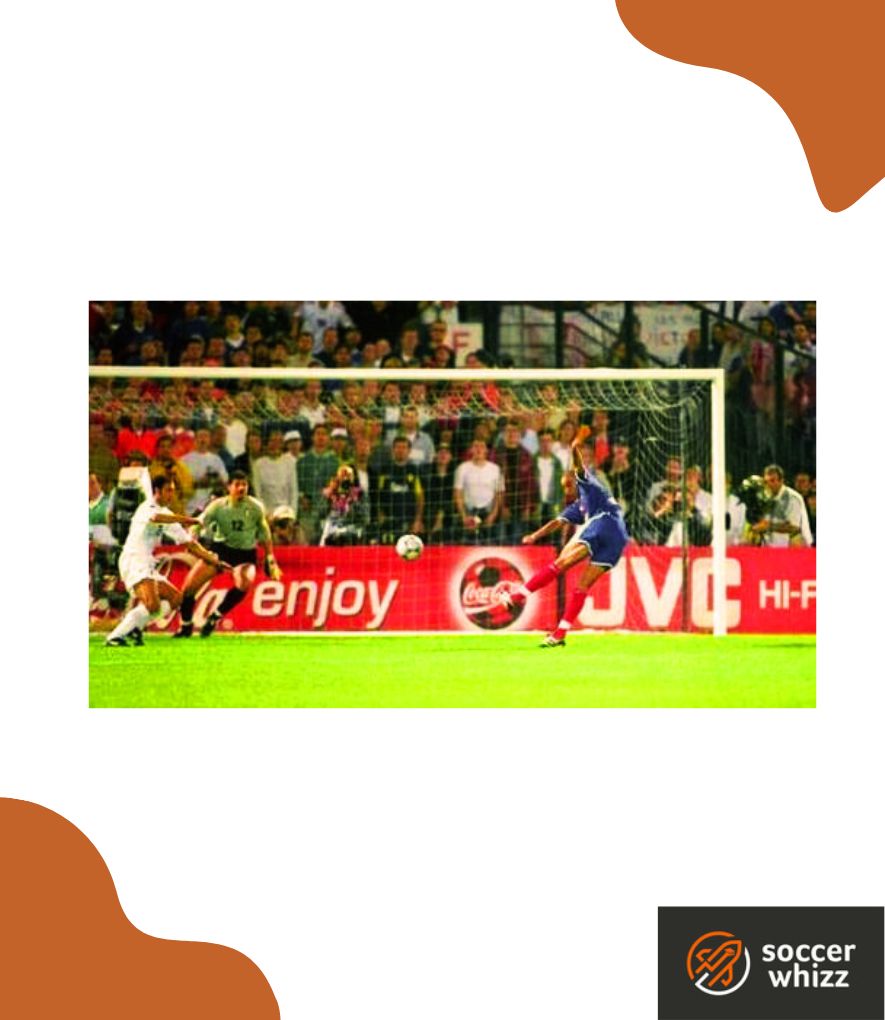Defined as the decisive goal scored during extra time, the golden goal represents the pinnacle of soccer drama.
It’s the ultimate game-changer, capable of transforming a tense stalemate into a euphoric celebration or crushing defeat within seconds.
From the World Cup to the UEFA Champions League, this rule has shaped some of the most memorable and emotionally charged moments in the history of the beautiful game.
Let’s start off with a quick definition of the term…
The golden goal is a rule used in extra-time (typically a knockout match) to determine the overall winner of a soccer match. The team to score the first goal in the extra time period would immediately be declared as the winner of the fixture, with the referee blowing the full time whistle after the ball hit the back of the net.
In this article, we delve deeper into the concept of the golden goal, exploring its origins, impact, and the enduring legacy it has left on the sport.
We’ll also examine the rule’s implementation across various competitions, discussing the controversies and thrills that have unfolded under its banner.
When is the golden goal used in a soccer game?
The golden goal emerges as a significant and decisive factor in the soccer landscape, serving as the first and sole goal that breaks through in extra time, promptly concluding the game.
Once the regular playing time has elapsed, a new phase known as extra time commences.
During this period, teams are granted an additional 30 minutes to seize victory unless the fateful golden goal is scored.
In competitions where the golden goal rule is in effect, extra time adopts an enthralling “next goal wins” format.

In essence, FIFA tried to up the excitement ante associated with official knockout games by introducing the rule to promote attacking displays in the extra time period.
The logic behind it was that tension intensifies as both teams strive to secure that pivotal goal, knowing that its arrival would seal their triumph and terminate the match in an instant.
However, should no goal materialize within the 30 minutes of extra time, the game would proceed to a penalty shootout.
At this point, the winner would be determined not by a golden goal, but through a series of penalty kicks.
Which teams have won trophies courtesy of the golden goal rule?
There have been quite a few benefactors of the golden goal implementation across the sports professional scene.
Here are a few notable examples:
1. Germany
In the enthralling tournament of UEFA Euro 1996, Germany etched their name in soccer history by securing victory through the implementation of the golden goal rule.

German midfielder Oliver Bierhoff unleashed a powerful strike that found the back of the net, shattering Czech hopes and propelling Germany to victory.
Here’s a look at that moment:
This goal marked the first and only goal of extra time, instantly ending the game as per the golden goal rule.
2. France
France made history by winning the UEFA Euro 2000 tournament on home soil.

In the final against Italy, the match went into extra time, and David Trezeguet struck a golden goal in the 103rd minute, securing a 2-1 victory for France and crowning them as European champions.
Check it out for yourself below:
3. Argentina
Argentina emerged as champions in the Men’s Olympic Football Tournament held in Athens, Greece.
In the final against Paraguay, Carlos Tevez delivered the golden goal in the 18th minute of extra time, granting Argentina a 1-0 victory and the gold medal.
Why was the golden goal rule removed?
The golden goal rule was eventually removed from soccer due to various factors and criticisms surrounding its implementation.
Here are some of the reasons that led to the removal of the golden goal rule:
1. Lack of fairness
One of the main criticisms of the golden goal rule was that it often resulted in an unfair outcome.
Teams that had performed admirably throughout the match and in extra time could be defeated by a single goal, which some considered unjust.
The rule was seen to favor defensive strategies, as teams would often prioritize avoiding conceding a goal rather than taking risks to score.
2. Reduced excitement
While the golden goal rule aimed to add excitement and create a sense of urgency, it did not always achieve this goal.
In some cases, teams became overly cautious, leading to a more conservative style of play in extra time.
This defensive mindset resulted in fewer scoring opportunities, which ultimately diminished the spectacle and intensity of the game.
And of course that in itself was against the spirit of the game, which has always been about providing an entertaining spectacle for spectators to enjoy.
3. Tactical manipulation
Coaches and teams sometimes exploited the golden goal rule strategically.
Rather than playing to win outright, they would adopt a defensive approach, hoping to take the game to a penalty shootout where the outcome becomes a matter of chance.
This manipulation of the rule went against the spirit of the game and led to dissatisfaction among fans and players.
Will the golden goal rule ever return in competitive tournament formats?
While the golden goal rule has been removed from most major soccer competitions, it’s not entirely impossible for it to make a comeback in the future.
Rule changes in sports are often driven by a variety of factors, including fan opinions, governing body decisions, and experimentation with different formats.
If there is a growing demand or desire from fans and stakeholders to reintroduce the golden goal rule, it’s actually quite conceivable that it could be reconsidered for specific tournaments or as an experimental option in the future.
However, it would likely require careful evaluation and addressing the concerns that led to its removal initially, such as fairness, excitement, and tactical manipulation.
Ultimately, the decision to bring back the golden goal rule or implement any rule change lies in the hands of the relevant soccer governing bodies and their assessment of the overall impact and benefits it would bring to the sport.
Is there a silver goal rule in soccer?
The silver goal rule was introduced as a modification of the golden goal rule to address some of the criticisms and perceived unfairness associated with the golden goal.
Under the silver goal rule, if a team scored a goal during the first half of extra time, the game would be declared complete if the team held that lead until the half time break in extra time.
Here’s a source on that if you want to read more about the concept.
The silver goal rule was implemented in some major competitions, such as the UEFA European Championships, including Euro 2004.
However, it was later abandoned and is no longer used in official matches.
The reasons for its discontinuation were similar to those for the golden goal rule, including concerns about fairness and excitement.
Concluding thoughts
The golden goal in soccer, an exhilarating concept that captivated fans and players alike, left an indelible mark on the sport during its time of implementation.
As a rule that declared the match over immediately upon the first and only goal scored in extra time, the golden goal brought a thrilling sense of urgency and sudden-death intensity to the game.
As fans, we can reflect on the golden goal rule with nostalgia and appreciation for the breath taking moments it produced.
Whether it resurfaces in the future or not, the golden goal will forever hold a special place in the heart of soccer, reminding us of the remarkable power of that one pivotal goal that can define triumph or heartbreak in an instant.
If you’ve enjoyed this short read, then you may also be interested to have a look through other pieces of content on our blog, such as:
If you enjoy the content that I create and would like to buy me a coffee, then I’d really appreciate it!
Any money that I earn through this donation will be re-invested into more content for this website.
Additionally, by sending in a donation you’ll also receive a copy of my recently released 190+ page eBook on Soccer Ball Care, as well as be subscribed to our mailing list where you’ll be regularly informed on the latest developments concerning the Soccer Whizz blog.
- Future Icons: Europe’s Emerging Midfield Maestros Set for Glory - December 4, 2023
- Kickstarting a Revolution: How Soccer Transformed the United States Over the Last Four Years - October 7, 2023
- 4-1-4-1 Soccer Formation [Analysis] - September 23, 2023

